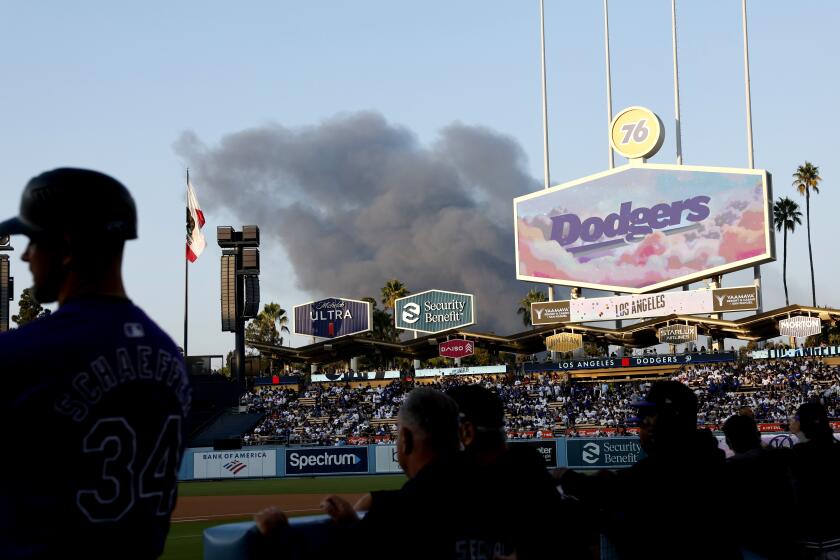Report finds flaws in L.A. County’s system for defending children accused of crimes
Attorneys who defend many juveniles charged with serious crimes in Los Angeles County get fewer resources and less oversight than in other large California counties, according to a long-awaited report released Monday.
Most youths charged with crimes in L.A. County are represented by deputy public defenders if their families can’t afford to hire private defense attorneys. When there is a potential conflict of interest — for instance, if the public defender’s office is already representing another defendant charged in the same case — private attorneys who contract with the county are appointed. Those lawyers, known as panel attorneys, are paid a flat rate of $340 to $360 per case.
Advocates have argued for years that the rate is too low for the amount of work required to provide an effective defense, and that children suffer as a result.
The county commissioned researchers at UC Berkeley’s Chief Justice Earl Warren Institute on Law and Social Policy in 2014 to look into a wide-ranging set of issues in the county’s defense system for minors charged with crimes.
The researchers looked at the juvenile defense systems in 10 other large counties, including Orange, San Diego and San Bernardino, and found that Los Angeles is the only one that pays attorneys a flat per-case fee. In other counties, attorneys representing minors accused of crimes were paid a salary or hourly rate, or were paid a flat fee that varied based on the type of case and how much work was involved.
They also found that L.A. was the only county surveyed with no centralized body providing oversight or quality control for the panel attorneys, and the only one that did not give them access to county-paid investigators to help them prepare a defense.
Public defenders have access to investigators through their office, but the private panel attorneys must hire their own investigators and pay them out of pocket.
The report found panel attorneys in L.A. County had higher caseloads than those in other counties. The annual caseload averaged 289, but one attorney handled as many as 661 cases a year. In Alameda County, panel attorneys handled about 14 cases a year, and in Kern County, the average was 75 to 80.
The private panel attorneys are assigned about 28% of juvenile cases filed in L.A. County each year, but handle many of the most serious cases, including representing the bulk of juveniles who faced potential trial as adults. Among those youths, the ones represented by panel attorneys were more likely to end up being transferred to adult court, the researchers found — 26% compared with 13% of those represented by public defenders over the last five years.
The researchers found that panel attorneys in those cases “consulted less often with experts, provided less documentation to support the client and filed fewer motions.”
Minors represented by the panel attorneys were also more often sent to state or county lockups, the report found.
An earlier report on the same issue completed by Loyola Law School made similar findings.
Critics argued that the Loyola report failed to take into account other factors that might influence case outcomes, such as the history of the juveniles involved and the more complex nature of many of the cases assigned to panel attorneys.
The Berkeley researchers acknowledged, “It is possible that the difference in outcomes is a result of different resource use and attorney practices. It is also possible, however, that the difference in outcomes is a result of different types of clients.”
But Cyn Yamashiro, an attorney and county probation commission member who headed up the research for the earlier report, said the new research validated his team’s findings.
“The problem with the model that L.A. uses is it provides lawyers the exact opposite incentive you would want your lawyer to have if they were working for you,” he said.
Yamashiro and other advocates argue that the minors who can’t be represented by the public defenders office should go to the county’s alternate public defender office, as adults and a small number of juveniles do now.
Supervisor Mark Ridley-Thomas, who originally asked for the review, said he wants to have the county’s chief executive look at that and other options for overhauling the juvenile defense system, such as changing the fee structure and asking the county bar association to provide oversight of the panel attorneys.
“The need to make sure that justice is done for these juveniles is a high priority, and the extent to which they have not been adequately served can no longer be tolerated,” he said.
Twitter: @sewella
Join the conversation on Facebook >>
ALSO
What’s ahead for bullet train funding? Hearing outlines the many risks
Former San Diego mayor was ‘creepy,’ but woman didn’t feel harassed, co-worker testifies
More to Read
Sign up for Essential California
The most important California stories and recommendations in your inbox every morning.
You may occasionally receive promotional content from the Los Angeles Times.











